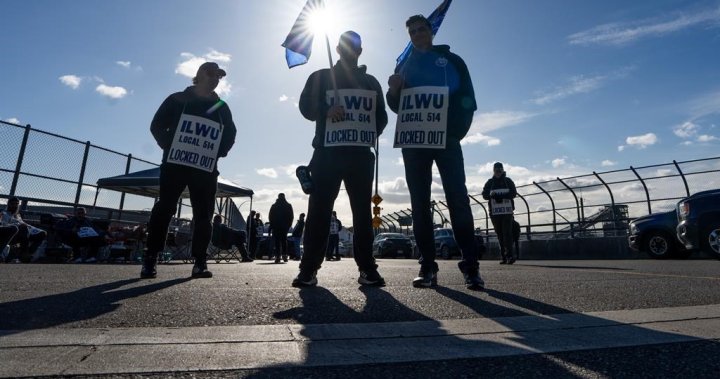Federal Labour Minister Steven MacKinnon has expressed concern over the slow progress in resolving port disputes in British Columbia and Montreal. The lockout at British Columbia’s ports, involving a dispute between employers and foremen, has been ongoing for four days, while the Port of Montreal has been on strike since Thursday. MacKinnon stated that there is a lack of urgency in reaching agreements in both negotiations and emphasized the need for quick resolution. The Retail Council of Canada has also expressed frustration with the lack of movement in the disputes, warning of potential empty shelves as the holiday season approaches.
Matt Poirier from the Retail Council of Canada highlighted the significant impact the port disruptions could have on the holiday season, where timely deliveries are crucial. He described the situation as a “triple-threat” due to ongoing labor disruptions at Canada Post, the lockout of unionized workers at B.C. ports, and the strike at Montreal’s container terminals. Poirier emphasized the urgency in resolving the disputes to prevent further delays in the supply chain. Retailers could face serious consequences if the disruptions continue, potentially jeopardizing their ability to meet customer demands during the busy holiday season.
The lockout by the BC Maritime Employers Association at container port facilities across British Columbia has resulted in ongoing silence from employers and the union representing foremen. Labor expert Mark Thompson noted the unusual nature of the situation, with no talks scheduled between both parties. The employers have made a final offer to the union, indicating a potential standstill in negotiations. However, the federal government has been cautious about intervening further, as the right to strike is protected by the Canadian Constitution. The International Longshore and Warehouse Union Local 514 has maintained pickets at terminal sites across B.C., underscoring the continued labor dispute over issues such as port automation’s impact on workers.
The ongoing dispute at B.C. ports follows a separate labor conflict last year that resulted in a 13-day strike, freezing port operations. The Port of Vancouver, Canada’s largest port, has also experienced disruptions involving railways and grain terminal workers in recent months. The situation has raised concerns about the stability of the port operations and their impact on the broader supply chain. At the Port of Montreal, up to 320 workers have been on strike, paralyzing a significant portion of the port’s container-handling capacity. The union affiliated with the Canadian Union of Public Employees has indicated a willingness to end the strike if an agreement is reached on scheduling issues.
Vancouver Fraser Port Authority president and CEO Peter Xotta was scheduled to address the state of the port at a pre-scheduled event, highlighting the significance of the port in the region’s economy. The ongoing port disputes in British Columbia and Montreal have underscored the vulnerability of Canada’s supply chain infrastructure to labor disruptions. The lack of progress in negotiations and the potential long-term impact on retailers and consumers necessitate urgent action to resolve the disputes. The federal government, labor unions, and employers must work together to find a solution that balances the needs of workers, businesses, and the economy at large. Failure to address the port disputes promptly could have far-reaching consequences for Canada’s maritime industry and its ability to meet domestic and international trade demands.













